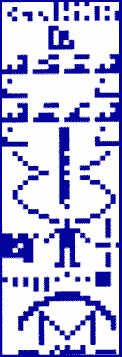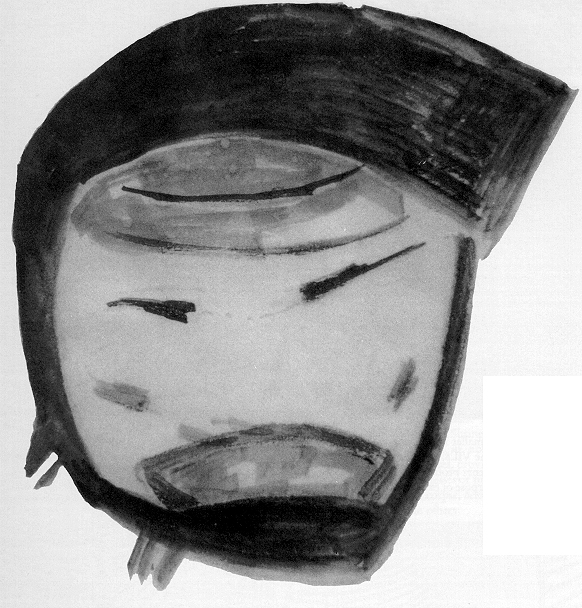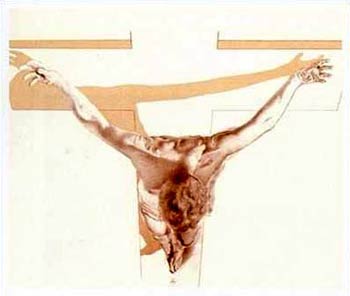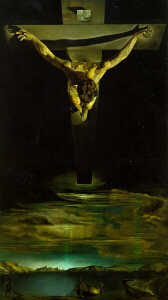|
| |
. . . What, exactly,
is shifting in this paradigm ?
Four Theatres of Perspectival
Change
Number THREE :
THE DEFINITION OF
"HUMAN BEING"
Signs of a paradigm shift are seen in a
process of deconstructing and reconstructing what it means to be a human being.
The questions are often ancient ones, but as they resurface in light of new data, they
have the effect of cracking the shell of old notions, breaking us out into larger,
liberating perspective.

A little over a quarter century ago,
astronomers sent a powerful transmission into space in hopes that someday the
message would be received by an extraterrestrial civilization far
away. The transmission can be decoded several ways to convey
information about human life and planet Earth. It can be arranged
into a diagram showing, among other things, a human stick figure, the solar
system, the telescope itself and the DNA
molecule. http://www.seti.org/science/a-message.html
1. How is human being a function of social
being?
- Cross-cultural studies and feminism have
exposed ethnocentrism and, more basically, androcentrism in such a
way that, although they certainly remain deeply embedded in our institutions and
attitudes, they can no longer remain unchallenged, safely invisible.
- Studies of racism and socioeconomic
class division focus ethical issues in terms of human solidarity and shared
destiny as well as in terms of justice. Enlightened human self-interest is served
better by an understanding of human identity which emphasizes cooperation and
complementarity rather than contention and domination.
- However, closely following any advocacy
of a rescuing sense of human solidarity arises the issue of the meaning and place of
the individual relative to the communal. The debate is no longer urged as a
contrast of Soviet communism with Western democracy, in the Cold War terms of
state-authority-versus-personal-liberty. But tensions between individual freedom and the
needs of society persist. We have found liabilities in radical individualism and lack of a
shared value system. But one reaction to that, the rise of assorted fundamentalist
movements worldwide, also has dangers. We face tensions between the values of communal,
tribal societies and capitalist, industrialized societies. Human being is personal
being, yet personal being is a function of social being. The question is old, but
the discussions are new, against a global backdrop, about how individual and social being
balance each other in authentic human being.
- A new emphasis on the place of parenting
moves the comprehensive needs and interests of children from the periphery to the center
of our attention. The cultivation of the next generation is a responsibility for which not
merely the nuclear family, but the larger human community is accountable. If it takes a
village to raise a child, and the village has become global, then nurture of children is
not an incidental matter in international human affairs. How is parenthood in this
corporate sense going to be constitutive of our definition of human being?

Transcription of detail from wall mural no. 11
Catalhouyuk, Neolithic settlement excavated in Turkey. Image source: http://www.smm.org/catal/
It is the first urban center in the world (7000 BC) and has the first known wall paintings and
sculptures.
Excavation web site:
http://catal.arch.cam.ac.uk/catal/catal.html
2. How does sexuality fit into the
definition of human being?
- Biology is not necessarily destiny, nor
should it be if what are traditionally called "higher" human capacities are
indeed higher. We recognize the human capacity for reason, for moral responsibility, for
thinking beyond the present, for love and commitment. That such capabilities transcend
biological functions is suggested, for instance, by the fact that we are able to separate
reproduction from sexuality theoretically, ideologically, and now even technologically.
Ironically, Christian anthropology has often, where convenient for vested interests,
substituted an appeal to biological over theological argument to validate prejudicial
constructions of gender and of sexuality. However, if spiritual and rational
faculties outrank biological ones, then the definition of family and partnership
commitment, of the role of gender in personal identity, of reproductive stewardship,
parenting responsibility, may need to take biological issues in to account, but must
be determined on other grounds.
- The human population of the planet
exceeds six billion. How, in light of the foreseeable consequences, ought humankind to exercise
stewardship of its reproductive capability? What is the
accountability of human beings in procreation?
3. How is human being a function of physical,
psychological, and spiritual being?
- Rigid divisions of body and mind are
crumbling. It appears that the human being is a creature too subtly made and too
subtly linked for some of the old reductionist descriptions, scientific or otherwise.
PierrreTeilhard de Chardin once said, "We are not human beings having a spiritual
experience. We are spiritual being having a human experience." To what extent is
spiritual nature constitutive of human being? Even in academic circles, there seems to be
a new willingness to consider this question.

Salvador Dali Drawing for "Christ of
St John" 1951
http://www.allposters.com
- Studies of thought reform
and coercive
influence have ruptured Enlightenment illusions
about the impregnability of the
individual’s autonomous reason, and have revealed the vulnerability of freedom of
thought. "Freedom" as a political and personal concept seems much more fragile
than had been supposed. We must now delineate the psychological preconditions of
freedom that figure in what it means to be "human."

Salvador Dali Christ of
Saint John of the Cross, 1951
http://www.mmlab.ktu.lt/Dali/page24.html

|